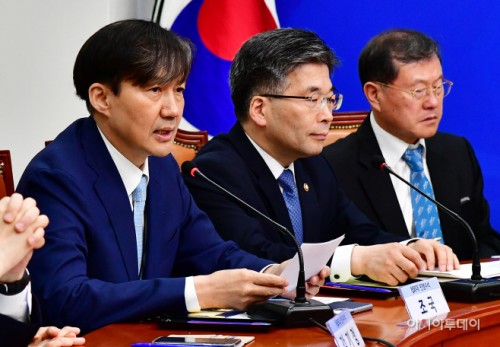 |
| Cho Kuk, senior presidential secretary on civil affairs, discusses with related officials on police reform measures at the National Assembly on Monday./ Photographed by Lee Byung-hwa (photolbh@) |
By AsiaToday reporters Lee Seok-jong & Jeon Seo-in
A new state investigative agency will be established to separate police tasked with investigate assignments from general police. In addition, test operation regions of an autonomous police system will be additionally designated while the number of new police academy students will be cut by half.
The ruling Democratic Party (DP), the government and the presidential Cheong Wa Dae held a meeting on police reform at the National Assembly on Monday, and announced a set of reform measures.
The key point of the reform measures is the establishment of a state investigative control tower.
DP Policy Chief Rep. Cho Jeong-sik said the move is aimed at preventing high-ranking officers from inappropriately interfering in investigations. “Top-ranking police officers, including the commissioner general and the police chief, will be restricted from overseeing investigations,” Cho said.
In this case, the general police officers in charge of security and administrative affairs will be headed by the police chief, while the investigative police in charge of investigations will be led by the head of the state investigative agency.
Cho said the three parties had decided to push to introduce a local autonomous police system by designating more test operation regions while focusing on making it a law within the year.
Regarding concerns surrounding intelligence officers, Cho said, “We will clarify the range of activity of intelligence officers by law, to ban their involvement in politics and root out illegal inspection.”
Regarding police academy reform measures, Cho said, “In order to prevent monopoly of high-ranking police officers of police academy, we will reduce the number of new students from 100 to 50 and reduce various advantages.”
“The party, the government, and the presidential office plan to revise police reform laws together with investigative structure reform so that the National Assembly deliberation and resolution will take place in a timely manner,” Cho said.
The police reform measures of the three parties come amid concerns the police may become too powerful after readjusting the investigative power between the prosecution and the police.
The meeting was attended by officials from the ruling party and the government, including National Police Agency Commissioner General Min Gap-ryong, and officials from the presidential office, including Cho Kuk, senior presidential secretary on civil affairs.
Prosecutors did not release any official statement about the police reform plan, maintaining a cautious attitude.
However, a prosecution official said, “Even the police reform committee claimed that intelligence officers should be either abolished or separated from national police officers, but nothing has been changed. There is no information about how to control the state investigative agency or who will be in charge of state police officers in charge of investigations after separating state police officers from local ones.”
#state investigative agency #police reform
Copyright by Asiatoday
Most Read
-
1
-
2
-
3
-
4
-
5
-
6
-
7





















